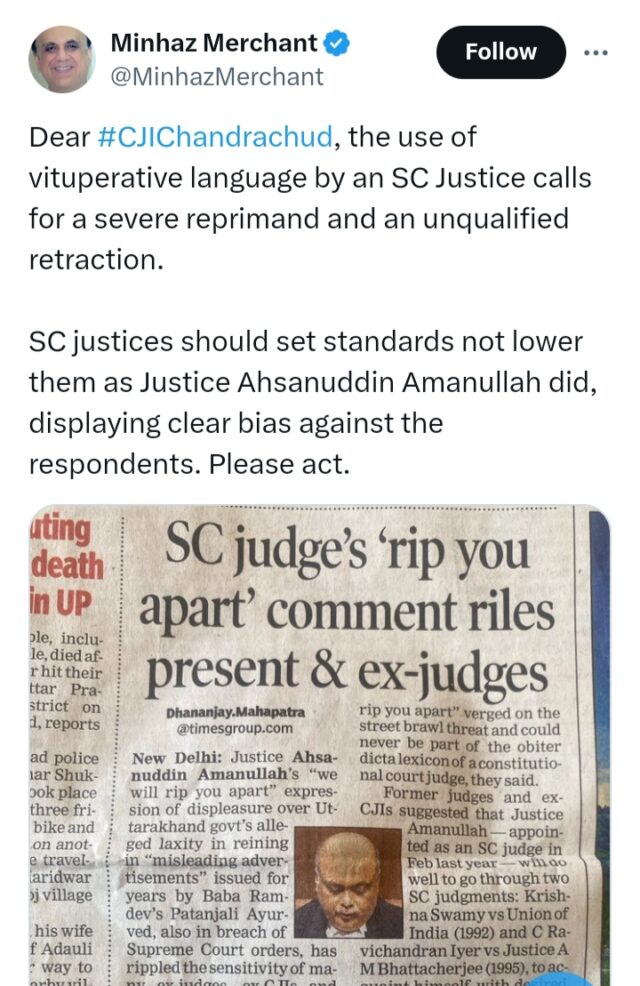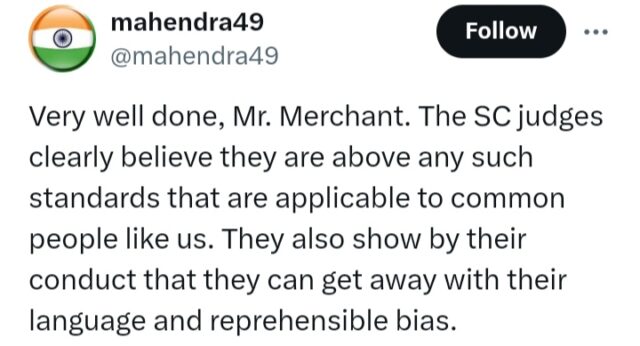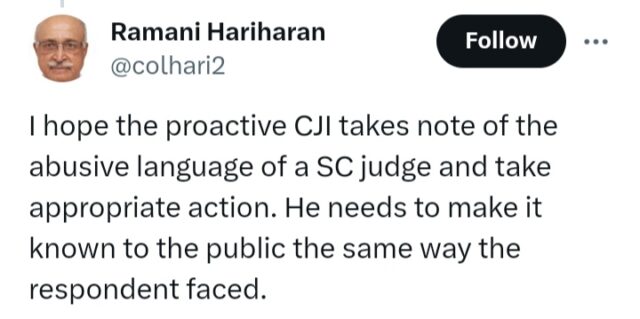The recent expression of displeasure by SC Judge Ahsanuddin Amanullah over the alleged laxity of the Uttarakhand government in controlling misleading advertisements issued by Baba Ramdev’s Patanjali Ayurved has sparked significant debate among former judges, ex-Chief Justices of India (CJIs), and current apex court judges.
This incident has raised questions about the standards of conduct expected from judicial authorities, particularly in the context of courtroom decorum and the exercise of contempt of court powers.
Upholding Standards of Sobriety and Restraint
Former judges and ex-CJIs have emphasized the importance of maintaining sobriety and restraint in court proceedings. They argue that courtrooms should serve as platforms for dispassionate debate centred around legality, constitutionality, and the rule of law.
The expression “we will rip you apart,” they contend, deviates from the expected demeanour of a constitutional court judge, resembling a street brawl threat rather than a measured judicial response.
“Court proceedings set standards of sobriety and restraint and have served as a platform for dispassionate debate revolving around legality, constitutionality and rule of law. The much-feared contempt of court power was meant to maintain the rule of law, the dignity of courts, and the sanctity of their orders,” they said.
The judges mentioned, “‘We will rip you apart’ verged on a street brawl threat and could never be part of the obiter dicta lexicon of a constitutional court judge.”
The discussion surrounding Justice Amanullah’s expression of displeasure brings into focus the purpose of contempt of court powers. Former judges and ex-CJIs assert that these powers are intended to uphold the rule of law, preserve the dignity of courts, and safeguard the sanctity of their orders.
However, the use of language that verges on intimidation or aggression risks undermining these principles. By invoking the spectre of contempt, judges must exercise discretion and temperance to ensure that their actions align with the broader objectives of justice and fairness.
Also Read: Woman Techie’s Comment On Ghazal Alagh’s Pregnancy Post On LinkedIn Gets Trolled
Reflections on Judicial Demeanors
Justice Amanullah’s scolding in April 2024 has brought to mind similar incidents in the past, such as proceedings before a bench led by Justice B N Agrawal on October 24, 2005.
In that instance, finding that senior politician Buta Singh, then governor of Bihar, was unauthorisedly holding onto a government bungalow in Delhi despite repeated eviction orders, the judge had remarked, “What is the Bihar governor doing with a bungalow in Delhi? He cannot be allotted a bungalow here. Throw him out.”
Former judges and ex-CJIs draw attention to established norms of judicial demeanour articulated in landmark Supreme Court judgments.
In Krishna Swamy vs Union of India, 1992, the Supreme Court stated, “The standards of judicial behaviour, both on and off the bench, are normally high… an unwritten code of conduct of well-established traditions is the guideline for judicial conduct. The conduct that tends to undermine public confidence in the character, integrity or impartiality of the judge must be eschewed. It is expected of him to voluntarily set forth wholesome standards of conduct reaffirming fitness to higher responsibilities.”
The Supreme Court emphasized, “The judges of higher echelons, therefore, should not be mere men of clay with all the frailties and foibles, human failings and weak character which may be found in those in other walks of life. In short, the behaviour of the judge is the bastion for people to reap the fruits of democracy, liberty and justice and the antithesis rocks the bottom of the rule of law.“
In C Ravichandran Iyer vs Justice A M Bhattacherjee, 1995, the Supreme Court asserted, “Judicial office is essentially a public trust. Society is, therefore, entitled to expect that a judge must be a man of high integrity, honesty and required to have moral vigour, ethical firmness and impervious to corrupt or venial influences. He is required to keep the most exacting standards of propriety in judicial conduct. Any conduct which tends to undermine public confidence in the integrity and impartiality of the court would be deleterious to the efficacy of judicial process.”
The SC further says, “Society, therefore, expects higher standards of conduct and rectitude from a judge. Unwritten code of conduct is writ large for judicial officers to emulate and imbibe high moral or ethical standards expected of a higher judicial functionary, as wholesome standard of conduct which would generate public confidence, accord dignity to the judicial office and enhance public image, not only of the judge but the court itself.“
Drawing from past judgments such as Krishna Swamy vs Union of India (1992) and C Ravichandran Iyer vs Justice A M Bhattacherjee (1995), it becomes evident that the conduct of constitutional court judges is held to a far superior standard than that of ordinary individuals in society.
Former judges and ex-CJIs advocate for a conscientious approach to judicial conduct, by adhering to established norms of decorum and professionalism.
Judicial Office as a Public Trust
The role of a judge is not merely a profession but a public trust, entailing high expectations of integrity, honesty, and moral rectitude. The judiciary’s efficacy hinges on public confidence in the impartiality and integrity of its members, necessitating the adherence to exacting standards of propriety and conduct.
Any conduct that undermines this confidence jeopardizes the effectiveness of the judicial process and erodes the public’s trust in the judiciary’s ability to dispense justice fairly and impartially.
Minhaz Merchant, a renowned author, and editor, wrote on X, “Dear #CJIChandrachud, the use of vituperative language by an SC Justice calls for a severe reprimand and an unqualified retraction. SC justices should set standards not lower them as Justice Ahsanuddin Amanullah did, displaying clear bias against the respondents. Please act.”
The netizens also agreed with the author and supported him through their replies to the post. One user wrote, “Very well done, Mr. Merchant. The SC judges clearly believe they are above any such standards that are applicable to common people like us. They also show by their conduct that they can get away with their language and reprehensible bias.”
Another user wrote, “How can a judge expect him/her to be called “milord” when they speak in street thug language ?! What signal is Mr.Amanullah sending to the country at large? Thankfully their fraternity has sat up straight to condemn it. He’s disgraced the profession & position, to put it mild.”
Judges must recognize that their actions and words carry significant weight and can impact public perception of the judiciary as a whole. Upholding the trust placed in them by society is essential to preserving the legitimacy and authority of the judicial system.
As custodians of justice, judges are expected to embody the highest standards of integrity, impartiality, and ethical conduct. By adhering to these principles, the judiciary reinforces public confidence in the rule of law and ensures that justice is administered fairly and impartially.
It is imperative for judges, both present and future, to reflect on the guidance provided by past judicial pronouncements and to conduct themselves in a manner befitting the solemn responsibility entrusted to them.
Sources: Times Of India, The Hindu, Deccan Herald
Find the blogger: Katyayani Joshi
This post is tagged under: Supreme Court, citizens, DY Chandrachud, reputation, decency, street brawl, ex judges, CJI, justice, public confidence, netizens, Twitter, integrity, language, society, profession, displeasure, professionalism
Disclaimer: We do not hold any right, or copyright over any of the images used, these have been taken from Google. In case of credits or removal, the owner may kindly mail us.
Other Recommendations:
Watch: Indian Prime Ministers From 1947 to 2024


































